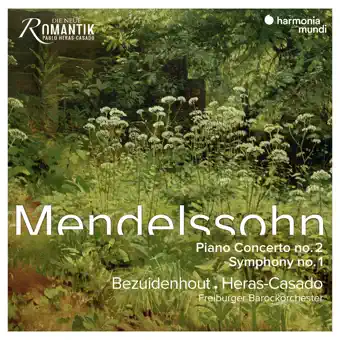mei 2019
Mendelssohn: Piano Concerto No. 2 & Symphony No. 1
Kristian Bezuidenhout & Freiburg Baroque Orchestra o.l.v. Pablo Heras-Casado
Kristian Bezuidenhout is on superb form here, a real period keyboard delight.

Tussen de stortvloed aan Mendelssohn-pianoconcertopnamen van de afgelopen maanden, zal de directe concurrent van deze nieuwe opname die van Ronald Brautigam zijn met de Kölner Akademie onder Michael Alexander Willens. Hij gebruikte een kopie (van Paul McNulty – wie anders?) van een Pleyel uit 1830, terwijl het instrument van Kristian Bezuidenhout een echt Érard is van zeven jaar later. Qua pianoklank klinkt die van Bezuidenhout misschien dichter bij wat je van een moderne piano zou verwachten. Hij is in staat tot een breed scala aan kleuren en dynamiek, kan zich meten met het Freiburger Barokorkest, maar produceert een prachtig gesluierde toon in het centrale Adagio.
Qua spel zijn de contrasten in aanpak echter duidelijker. Bezuidenhout is de meer naar binnen gerichte van de twee, een kwaliteit die wordt opgemerkt op zijn recente cd met Haydn-pianosonates (3/19); even blij om zijn passagewerk te laten rommelen in de body van het orkest als om te mijmeren over meer lyrische secties. De opname is iets ruimtelijker, met betrekking tot het ensemble in een sonisch panorama, dan de meer in het licht belichte BIS-opname. Dat past bij de onopvallende benadering van deze spelers, vooral als je beseft hoeveel van het concerto gemarkeerd is met piano en pianissimo.
De Freiburgers zijn ook in goede vorm, onder Pablo Heras-Casado. Deze cd voltooit hun cyclus van de symfonieën met de Eerste, gespeeld met de Sturm und Drang op 11, wat de afstamming benadrukt via Beethovens c mineur stemmingen tot laat Mozart, met name de kronkelige chromatiek en het contrapunt van de g mineur symfonie, K550. Het strijkersgeluid, ontdaan van vibrato, contrasteert levendig met de warmte van de blaasinstrumenten, met name de klarinet van Lorenzo Coppola, die opnieuw tot zijn recht komt in de sprookjesachtige ouverture The Fair Melusine – een heerlijk dessert na de twee zwaargewichten in mineur die eraan voorafgaan.

Among a flurry of Mendelssohn piano concerto recordings in recent months, the direct competitor to this new one will be Ronald Brautigam’s with the Cologne Academy under Michael Alexander Willens. He used a copy (by Paul McNulty – who else?) of an 1830 Pleyel, while Kristian Bezuidenhout’s instrument is an echt Érard from seven years later. In terms of piano sound, Bezuidenhout’s perhaps sounds closer to what one might expect of a modern piano. It’s capable of a wide range of colours and dynamics, holding its own against the Freiburg Baroque Orchestra but producing a beautifully veiled tone in the central Adagio.
In terms of the playing, however, contrasts in approach are more marked. Bezuidenhout is the more inward of the two, a quality noted in his recent disc of Haydn piano sonatas (3/19); as happy to allow his passagework to rumble away within the body of the orchestra as he is to muse on more lyrical sections. The recording is slightly more spacious, regarding the ensemble in a sonic panorama, than the more spotlit BIS recording. That suits the unshowy approach of these players, especially when you realise how much of the concerto is marked piano and pianissimo.
The Freiburgers are on fine form, too, under Pablo Heras-Casado. This disc completes their cycle of the symphonies with the First, played with the Sturm und Drang turned up to 11, highlighting its lineage back through Beethoven’s C minor moods to late Mozart, especially the tortuous chromaticisms and counterpoint of the G minor Symphony, K550. The string sound, bleached of vibrato, contrasts vibrantly with the warmth of the winds, most notably the clarinet of Lorenzo Coppola, who once again comes into his own in the fairy-tale overture The Fair Melusine – a delicious dessert after the two minor-key heavyweights that precede it.
